NUR341: End-of-Life Care - Reflection on Ethical Issues and Care Plan
VerifiedAdded on 2023/03/31
|12
|2577
|266
Case Study
AI Summary
This assignment presents a case study involving an 86-year-old patient, John McGregor (Mac), admitted to a hospice with COPD and Alzheimer's. The study delves into the ethical and legal issues surrounding end-of-life care, including patient autonomy, beneficence, and the importance of advance care planning. It addresses the challenges of decision-making when patients are uncooperative and the necessity of a holistic care plan that considers the patient's physical, emotional, and spiritual needs. Furthermore, the assignment includes a reflection on a nurse's experience with Mac and his wife, Dorothy, highlighting the emotional impact on both the patient's family and the healthcare provider, emphasizing the importance of self-care strategies for Dorothy and the nurse, and discussing the lessons learned about providing compassionate and respectful care in end-of-life situations, concluding with an action plan for improving future practice.
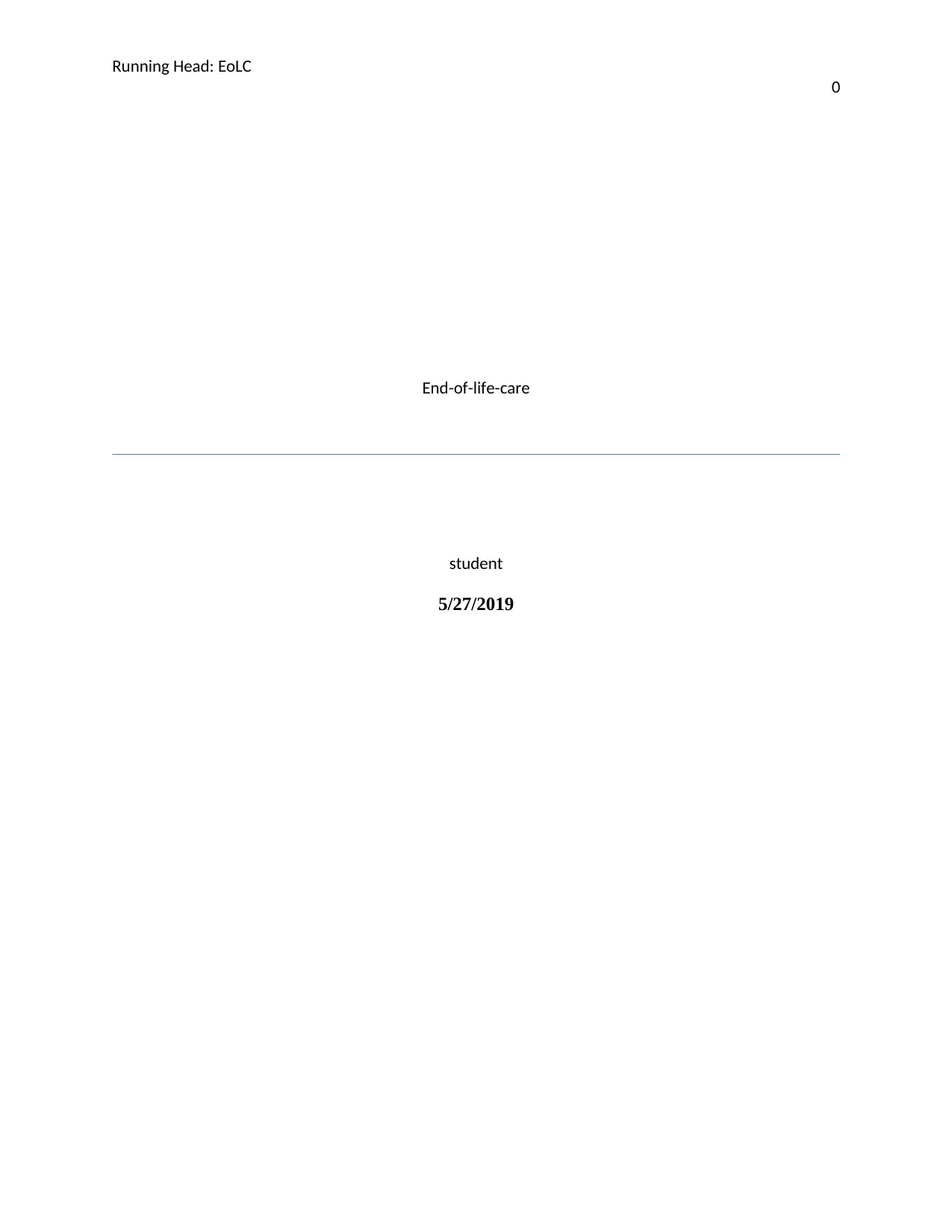
Running Head: EoLC
0
End-of-life-care
student
5/27/2019
0
End-of-life-care
student
5/27/2019
Paraphrase This Document
Need a fresh take? Get an instant paraphrase of this document with our AI Paraphraser
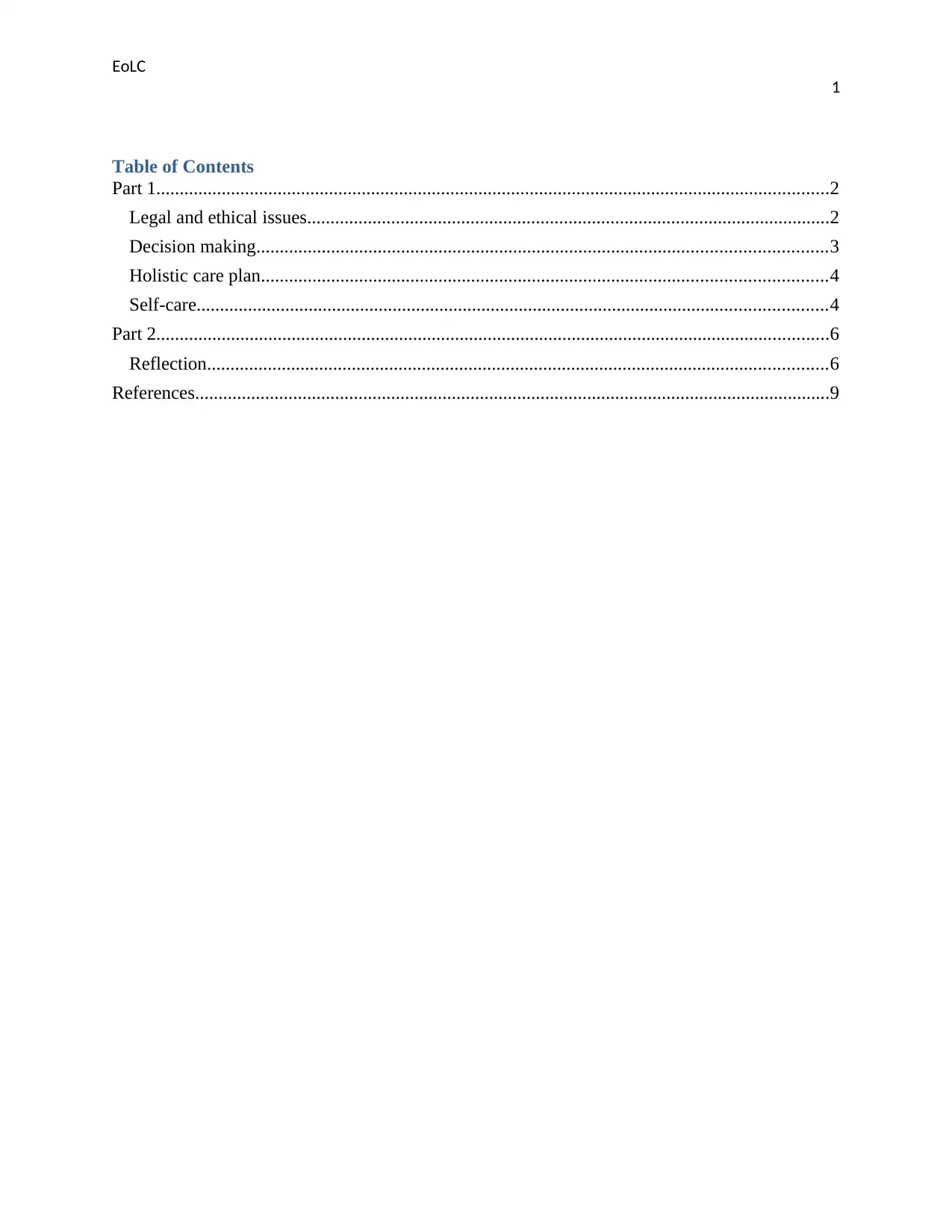
EoLC
1
Table of Contents
Part 1................................................................................................................................................2
Legal and ethical issues................................................................................................................2
Decision making..........................................................................................................................3
Holistic care plan.........................................................................................................................4
Self-care.......................................................................................................................................4
Part 2................................................................................................................................................6
Reflection.....................................................................................................................................6
References........................................................................................................................................9
1
Table of Contents
Part 1................................................................................................................................................2
Legal and ethical issues................................................................................................................2
Decision making..........................................................................................................................3
Holistic care plan.........................................................................................................................4
Self-care.......................................................................................................................................4
Part 2................................................................................................................................................6
Reflection.....................................................................................................................................6
References........................................................................................................................................9
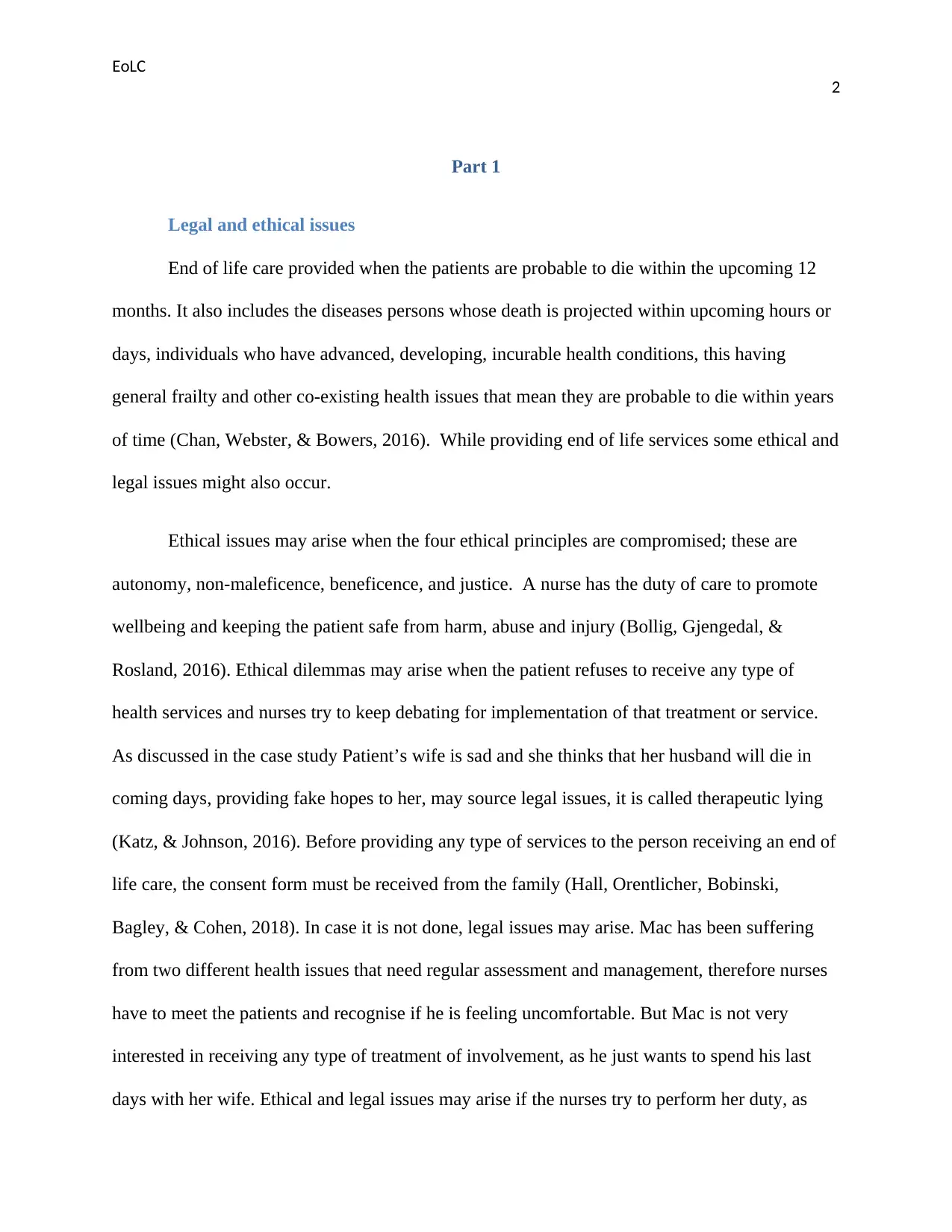
EoLC
2
Part 1
Legal and ethical issues
End of life care provided when the patients are probable to die within the upcoming 12
months. It also includes the diseases persons whose death is projected within upcoming hours or
days, individuals who have advanced, developing, incurable health conditions, this having
general frailty and other co-existing health issues that mean they are probable to die within years
of time (Chan, Webster, & Bowers, 2016). While providing end of life services some ethical and
legal issues might also occur.
Ethical issues may arise when the four ethical principles are compromised; these are
autonomy, non-maleficence, beneficence, and justice. A nurse has the duty of care to promote
wellbeing and keeping the patient safe from harm, abuse and injury (Bollig, Gjengedal, &
Rosland, 2016). Ethical dilemmas may arise when the patient refuses to receive any type of
health services and nurses try to keep debating for implementation of that treatment or service.
As discussed in the case study Patient’s wife is sad and she thinks that her husband will die in
coming days, providing fake hopes to her, may source legal issues, it is called therapeutic lying
(Katz, & Johnson, 2016). Before providing any type of services to the person receiving an end of
life care, the consent form must be received from the family (Hall, Orentlicher, Bobinski,
Bagley, & Cohen, 2018). In case it is not done, legal issues may arise. Mac has been suffering
from two different health issues that need regular assessment and management, therefore nurses
have to meet the patients and recognise if he is feeling uncomfortable. But Mac is not very
interested in receiving any type of treatment of involvement, as he just wants to spend his last
days with her wife. Ethical and legal issues may arise if the nurses try to perform her duty, as
2
Part 1
Legal and ethical issues
End of life care provided when the patients are probable to die within the upcoming 12
months. It also includes the diseases persons whose death is projected within upcoming hours or
days, individuals who have advanced, developing, incurable health conditions, this having
general frailty and other co-existing health issues that mean they are probable to die within years
of time (Chan, Webster, & Bowers, 2016). While providing end of life services some ethical and
legal issues might also occur.
Ethical issues may arise when the four ethical principles are compromised; these are
autonomy, non-maleficence, beneficence, and justice. A nurse has the duty of care to promote
wellbeing and keeping the patient safe from harm, abuse and injury (Bollig, Gjengedal, &
Rosland, 2016). Ethical dilemmas may arise when the patient refuses to receive any type of
health services and nurses try to keep debating for implementation of that treatment or service.
As discussed in the case study Patient’s wife is sad and she thinks that her husband will die in
coming days, providing fake hopes to her, may source legal issues, it is called therapeutic lying
(Katz, & Johnson, 2016). Before providing any type of services to the person receiving an end of
life care, the consent form must be received from the family (Hall, Orentlicher, Bobinski,
Bagley, & Cohen, 2018). In case it is not done, legal issues may arise. Mac has been suffering
from two different health issues that need regular assessment and management, therefore nurses
have to meet the patients and recognise if he is feeling uncomfortable. But Mac is not very
interested in receiving any type of treatment of involvement, as he just wants to spend his last
days with her wife. Ethical and legal issues may arise if the nurses try to perform her duty, as
⊘ This is a preview!⊘
Do you want full access?
Subscribe today to unlock all pages.

Trusted by 1+ million students worldwide
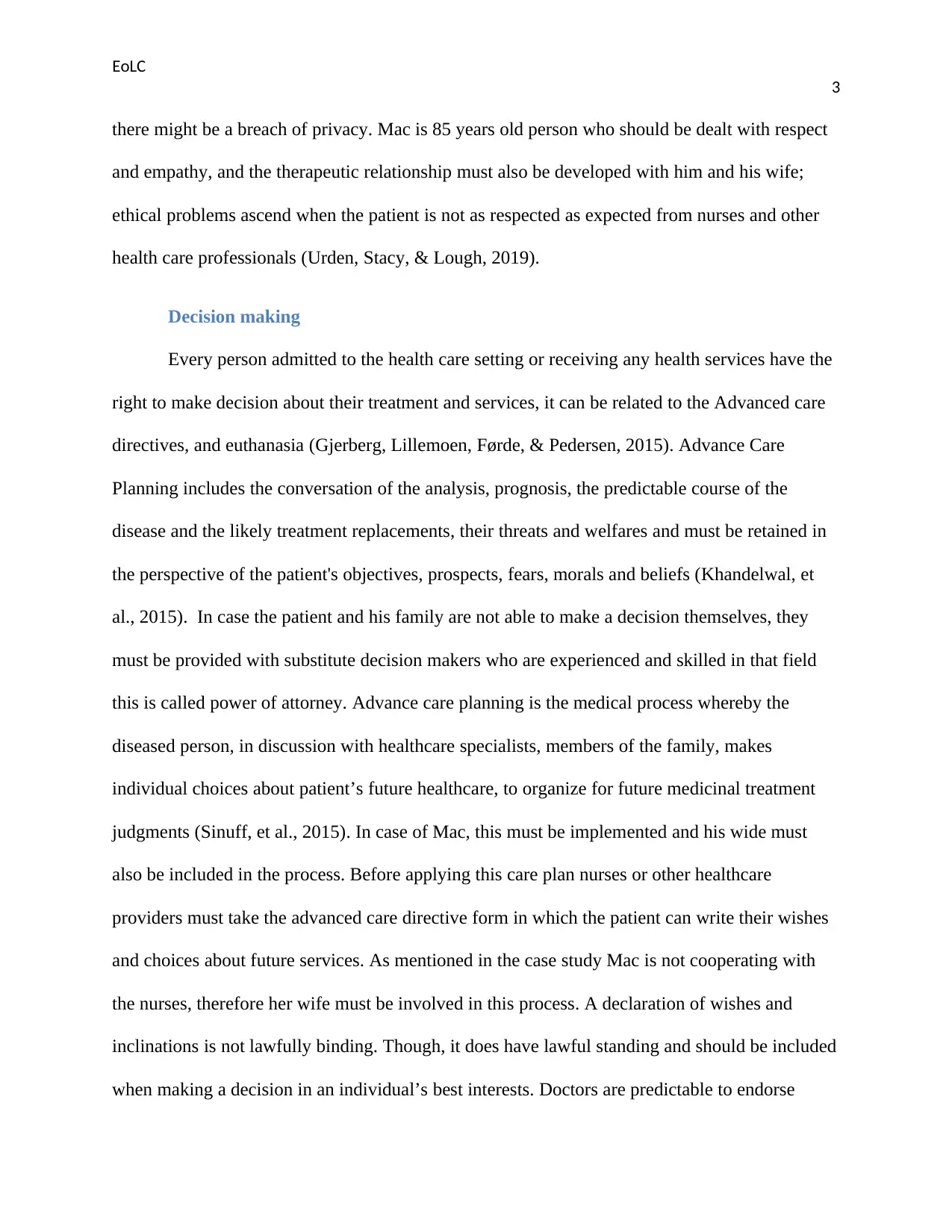
EoLC
3
there might be a breach of privacy. Mac is 85 years old person who should be dealt with respect
and empathy, and the therapeutic relationship must also be developed with him and his wife;
ethical problems ascend when the patient is not as respected as expected from nurses and other
health care professionals (Urden, Stacy, & Lough, 2019).
Decision making
Every person admitted to the health care setting or receiving any health services have the
right to make decision about their treatment and services, it can be related to the Advanced care
directives, and euthanasia (Gjerberg, Lillemoen, Førde, & Pedersen, 2015). Advance Care
Planning includes the conversation of the analysis, prognosis, the predictable course of the
disease and the likely treatment replacements, their threats and welfares and must be retained in
the perspective of the patient's objectives, prospects, fears, morals and beliefs (Khandelwal, et
al., 2015). In case the patient and his family are not able to make a decision themselves, they
must be provided with substitute decision makers who are experienced and skilled in that field
this is called power of attorney. Advance care planning is the medical process whereby the
diseased person, in discussion with healthcare specialists, members of the family, makes
individual choices about patient’s future healthcare, to organize for future medicinal treatment
judgments (Sinuff, et al., 2015). In case of Mac, this must be implemented and his wide must
also be included in the process. Before applying this care plan nurses or other healthcare
providers must take the advanced care directive form in which the patient can write their wishes
and choices about future services. As mentioned in the case study Mac is not cooperating with
the nurses, therefore her wife must be involved in this process. A declaration of wishes and
inclinations is not lawfully binding. Though, it does have lawful standing and should be included
when making a decision in an individual’s best interests. Doctors are predictable to endorse
3
there might be a breach of privacy. Mac is 85 years old person who should be dealt with respect
and empathy, and the therapeutic relationship must also be developed with him and his wife;
ethical problems ascend when the patient is not as respected as expected from nurses and other
health care professionals (Urden, Stacy, & Lough, 2019).
Decision making
Every person admitted to the health care setting or receiving any health services have the
right to make decision about their treatment and services, it can be related to the Advanced care
directives, and euthanasia (Gjerberg, Lillemoen, Førde, & Pedersen, 2015). Advance Care
Planning includes the conversation of the analysis, prognosis, the predictable course of the
disease and the likely treatment replacements, their threats and welfares and must be retained in
the perspective of the patient's objectives, prospects, fears, morals and beliefs (Khandelwal, et
al., 2015). In case the patient and his family are not able to make a decision themselves, they
must be provided with substitute decision makers who are experienced and skilled in that field
this is called power of attorney. Advance care planning is the medical process whereby the
diseased person, in discussion with healthcare specialists, members of the family, makes
individual choices about patient’s future healthcare, to organize for future medicinal treatment
judgments (Sinuff, et al., 2015). In case of Mac, this must be implemented and his wide must
also be included in the process. Before applying this care plan nurses or other healthcare
providers must take the advanced care directive form in which the patient can write their wishes
and choices about future services. As mentioned in the case study Mac is not cooperating with
the nurses, therefore her wife must be involved in this process. A declaration of wishes and
inclinations is not lawfully binding. Though, it does have lawful standing and should be included
when making a decision in an individual’s best interests. Doctors are predictable to endorse
Paraphrase This Document
Need a fresh take? Get an instant paraphrase of this document with our AI Paraphraser
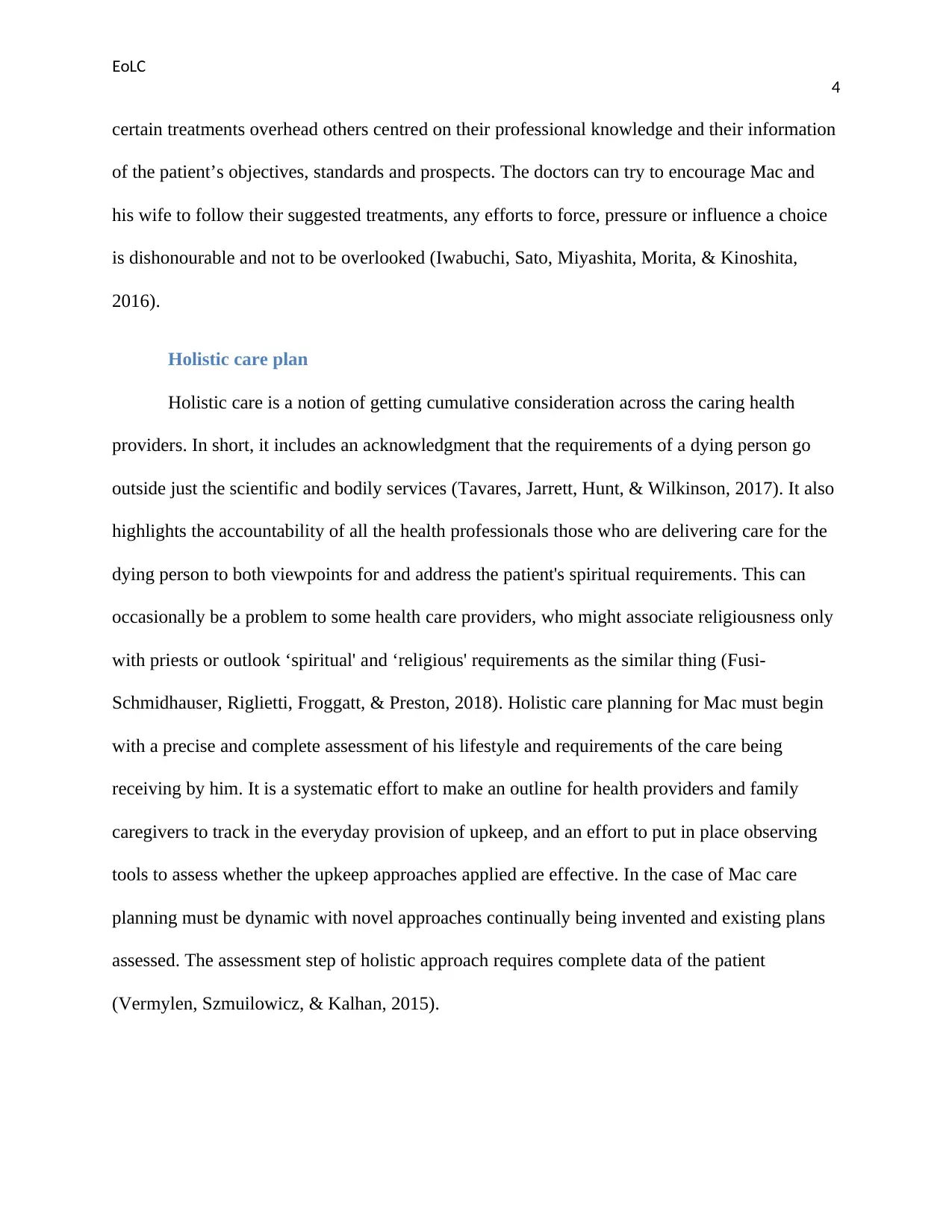
EoLC
4
certain treatments overhead others centred on their professional knowledge and their information
of the patient’s objectives, standards and prospects. The doctors can try to encourage Mac and
his wife to follow their suggested treatments, any efforts to force, pressure or influence a choice
is dishonourable and not to be overlooked (Iwabuchi, Sato, Miyashita, Morita, & Kinoshita,
2016).
Holistic care plan
Holistic care is a notion of getting cumulative consideration across the caring health
providers. In short, it includes an acknowledgment that the requirements of a dying person go
outside just the scientific and bodily services (Tavares, Jarrett, Hunt, & Wilkinson, 2017). It also
highlights the accountability of all the health professionals those who are delivering care for the
dying person to both viewpoints for and address the patient's spiritual requirements. This can
occasionally be a problem to some health care providers, who might associate religiousness only
with priests or outlook ‘spiritual' and ‘religious' requirements as the similar thing (Fusi-
Schmidhauser, Riglietti, Froggatt, & Preston, 2018). Holistic care planning for Mac must begin
with a precise and complete assessment of his lifestyle and requirements of the care being
receiving by him. It is a systematic effort to make an outline for health providers and family
caregivers to track in the everyday provision of upkeep, and an effort to put in place observing
tools to assess whether the upkeep approaches applied are effective. In the case of Mac care
planning must be dynamic with novel approaches continually being invented and existing plans
assessed. The assessment step of holistic approach requires complete data of the patient
(Vermylen, Szmuilowicz, & Kalhan, 2015).
4
certain treatments overhead others centred on their professional knowledge and their information
of the patient’s objectives, standards and prospects. The doctors can try to encourage Mac and
his wife to follow their suggested treatments, any efforts to force, pressure or influence a choice
is dishonourable and not to be overlooked (Iwabuchi, Sato, Miyashita, Morita, & Kinoshita,
2016).
Holistic care plan
Holistic care is a notion of getting cumulative consideration across the caring health
providers. In short, it includes an acknowledgment that the requirements of a dying person go
outside just the scientific and bodily services (Tavares, Jarrett, Hunt, & Wilkinson, 2017). It also
highlights the accountability of all the health professionals those who are delivering care for the
dying person to both viewpoints for and address the patient's spiritual requirements. This can
occasionally be a problem to some health care providers, who might associate religiousness only
with priests or outlook ‘spiritual' and ‘religious' requirements as the similar thing (Fusi-
Schmidhauser, Riglietti, Froggatt, & Preston, 2018). Holistic care planning for Mac must begin
with a precise and complete assessment of his lifestyle and requirements of the care being
receiving by him. It is a systematic effort to make an outline for health providers and family
caregivers to track in the everyday provision of upkeep, and an effort to put in place observing
tools to assess whether the upkeep approaches applied are effective. In the case of Mac care
planning must be dynamic with novel approaches continually being invented and existing plans
assessed. The assessment step of holistic approach requires complete data of the patient
(Vermylen, Szmuilowicz, & Kalhan, 2015).
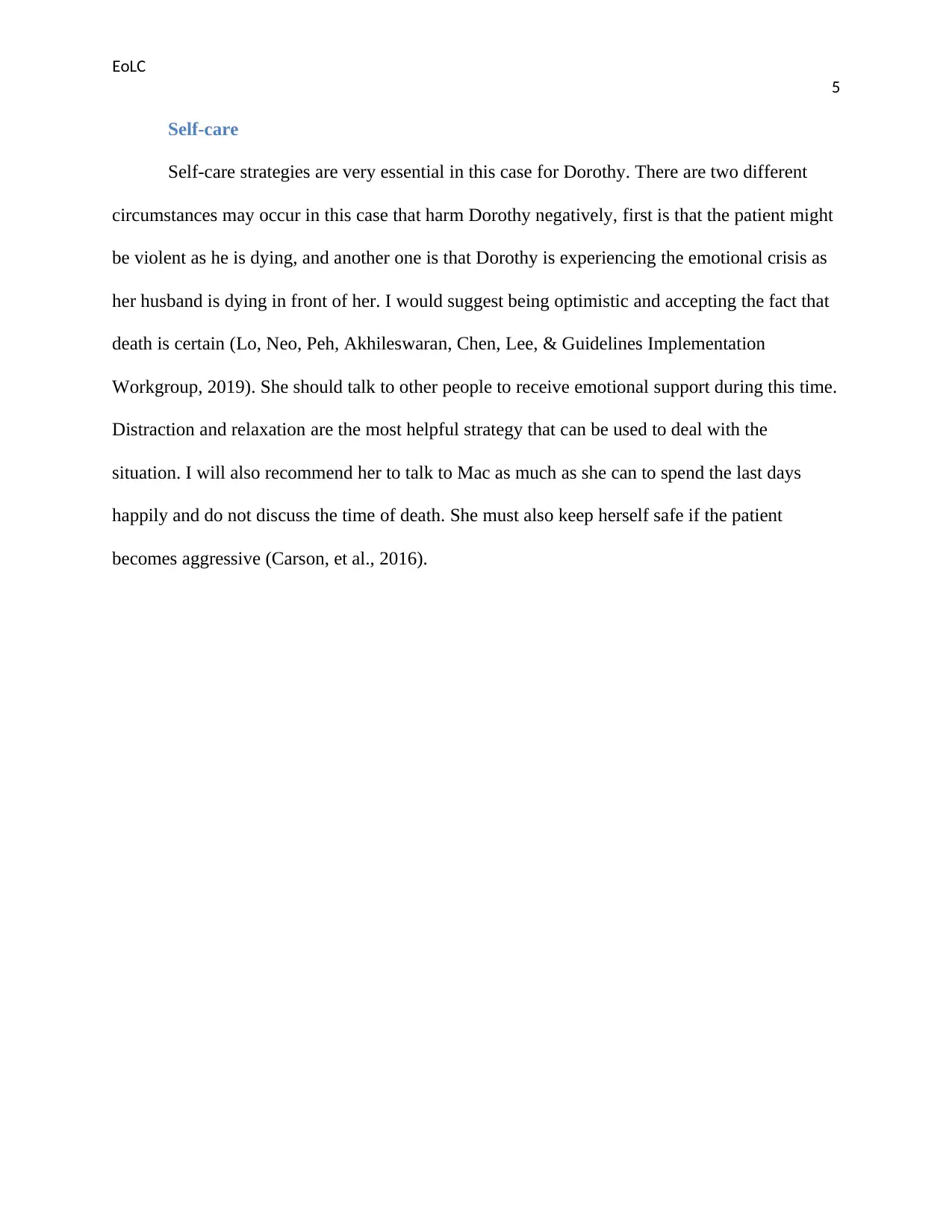
EoLC
5
Self-care
Self-care strategies are very essential in this case for Dorothy. There are two different
circumstances may occur in this case that harm Dorothy negatively, first is that the patient might
be violent as he is dying, and another one is that Dorothy is experiencing the emotional crisis as
her husband is dying in front of her. I would suggest being optimistic and accepting the fact that
death is certain (Lo, Neo, Peh, Akhileswaran, Chen, Lee, & Guidelines Implementation
Workgroup, 2019). She should talk to other people to receive emotional support during this time.
Distraction and relaxation are the most helpful strategy that can be used to deal with the
situation. I will also recommend her to talk to Mac as much as she can to spend the last days
happily and do not discuss the time of death. She must also keep herself safe if the patient
becomes aggressive (Carson, et al., 2016).
5
Self-care
Self-care strategies are very essential in this case for Dorothy. There are two different
circumstances may occur in this case that harm Dorothy negatively, first is that the patient might
be violent as he is dying, and another one is that Dorothy is experiencing the emotional crisis as
her husband is dying in front of her. I would suggest being optimistic and accepting the fact that
death is certain (Lo, Neo, Peh, Akhileswaran, Chen, Lee, & Guidelines Implementation
Workgroup, 2019). She should talk to other people to receive emotional support during this time.
Distraction and relaxation are the most helpful strategy that can be used to deal with the
situation. I will also recommend her to talk to Mac as much as she can to spend the last days
happily and do not discuss the time of death. She must also keep herself safe if the patient
becomes aggressive (Carson, et al., 2016).
⊘ This is a preview!⊘
Do you want full access?
Subscribe today to unlock all pages.

Trusted by 1+ million students worldwide
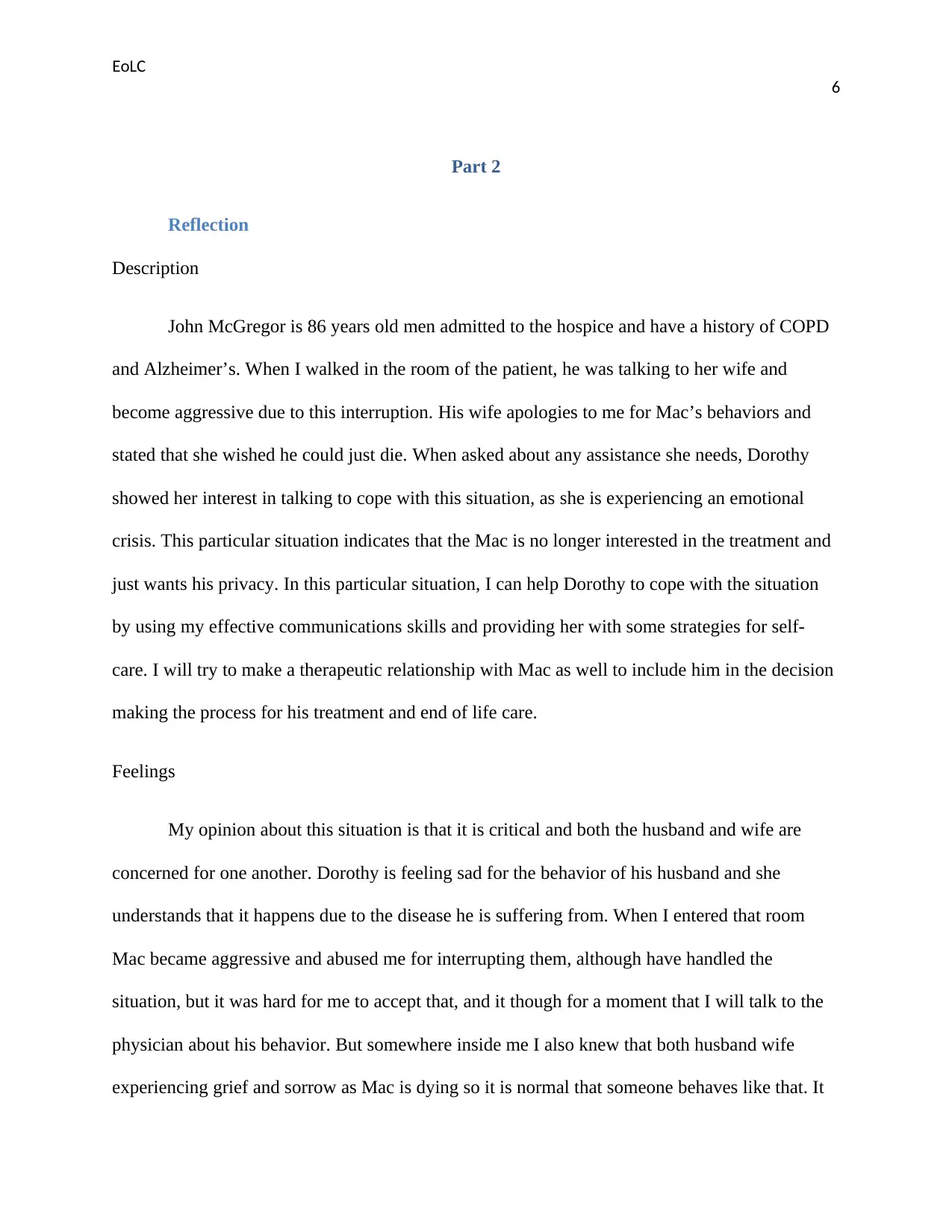
EoLC
6
Part 2
Reflection
Description
John McGregor is 86 years old men admitted to the hospice and have a history of COPD
and Alzheimer’s. When I walked in the room of the patient, he was talking to her wife and
become aggressive due to this interruption. His wife apologies to me for Mac’s behaviors and
stated that she wished he could just die. When asked about any assistance she needs, Dorothy
showed her interest in talking to cope with this situation, as she is experiencing an emotional
crisis. This particular situation indicates that the Mac is no longer interested in the treatment and
just wants his privacy. In this particular situation, I can help Dorothy to cope with the situation
by using my effective communications skills and providing her with some strategies for self-
care. I will try to make a therapeutic relationship with Mac as well to include him in the decision
making the process for his treatment and end of life care.
Feelings
My opinion about this situation is that it is critical and both the husband and wife are
concerned for one another. Dorothy is feeling sad for the behavior of his husband and she
understands that it happens due to the disease he is suffering from. When I entered that room
Mac became aggressive and abused me for interrupting them, although have handled the
situation, but it was hard for me to accept that, and it though for a moment that I will talk to the
physician about his behavior. But somewhere inside me I also knew that both husband wife
experiencing grief and sorrow as Mac is dying so it is normal that someone behaves like that. It
6
Part 2
Reflection
Description
John McGregor is 86 years old men admitted to the hospice and have a history of COPD
and Alzheimer’s. When I walked in the room of the patient, he was talking to her wife and
become aggressive due to this interruption. His wife apologies to me for Mac’s behaviors and
stated that she wished he could just die. When asked about any assistance she needs, Dorothy
showed her interest in talking to cope with this situation, as she is experiencing an emotional
crisis. This particular situation indicates that the Mac is no longer interested in the treatment and
just wants his privacy. In this particular situation, I can help Dorothy to cope with the situation
by using my effective communications skills and providing her with some strategies for self-
care. I will try to make a therapeutic relationship with Mac as well to include him in the decision
making the process for his treatment and end of life care.
Feelings
My opinion about this situation is that it is critical and both the husband and wife are
concerned for one another. Dorothy is feeling sad for the behavior of his husband and she
understands that it happens due to the disease he is suffering from. When I entered that room
Mac became aggressive and abused me for interrupting them, although have handled the
situation, but it was hard for me to accept that, and it though for a moment that I will talk to the
physician about his behavior. But somewhere inside me I also knew that both husband wife
experiencing grief and sorrow as Mac is dying so it is normal that someone behaves like that. It
Paraphrase This Document
Need a fresh take? Get an instant paraphrase of this document with our AI Paraphraser
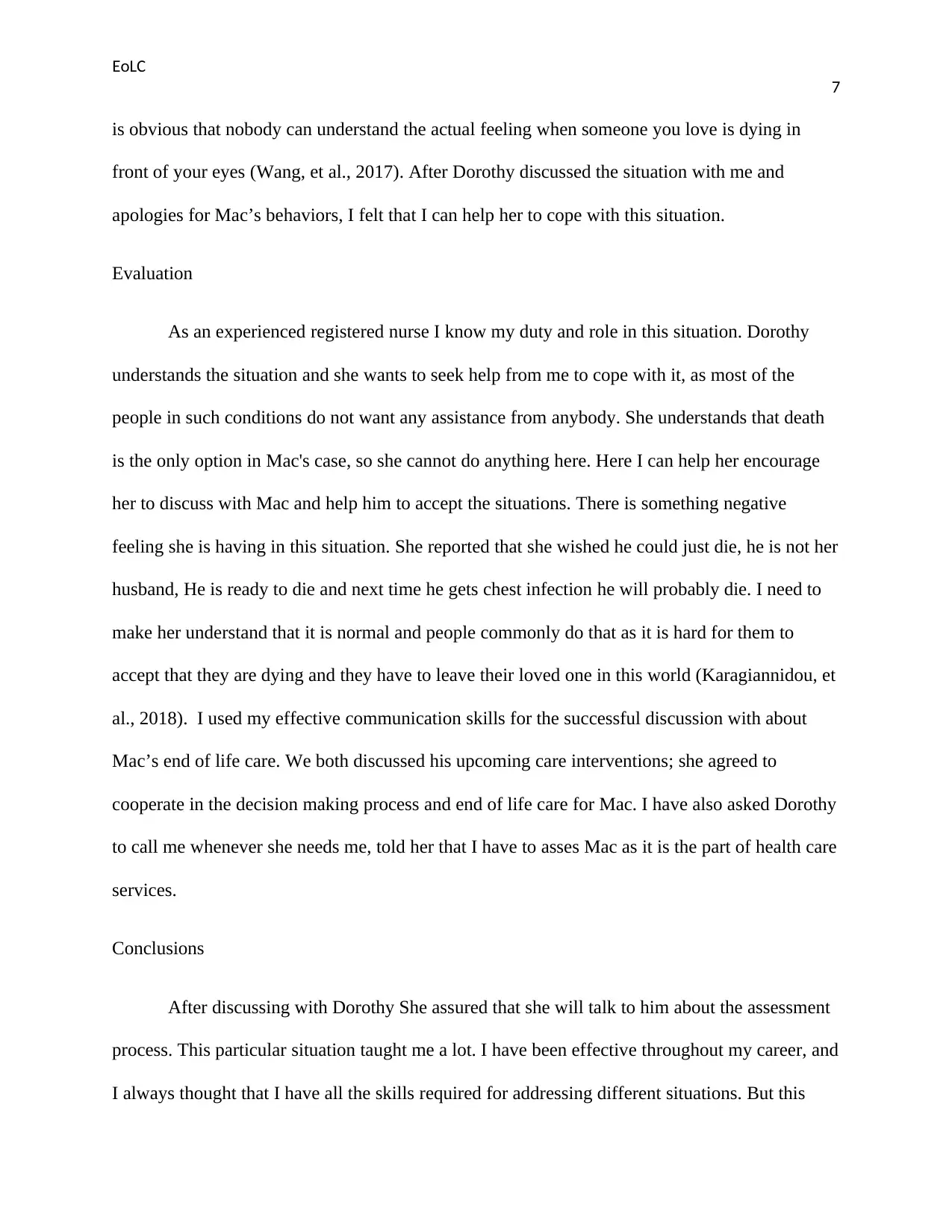
EoLC
7
is obvious that nobody can understand the actual feeling when someone you love is dying in
front of your eyes (Wang, et al., 2017). After Dorothy discussed the situation with me and
apologies for Mac’s behaviors, I felt that I can help her to cope with this situation.
Evaluation
As an experienced registered nurse I know my duty and role in this situation. Dorothy
understands the situation and she wants to seek help from me to cope with it, as most of the
people in such conditions do not want any assistance from anybody. She understands that death
is the only option in Mac's case, so she cannot do anything here. Here I can help her encourage
her to discuss with Mac and help him to accept the situations. There is something negative
feeling she is having in this situation. She reported that she wished he could just die, he is not her
husband, He is ready to die and next time he gets chest infection he will probably die. I need to
make her understand that it is normal and people commonly do that as it is hard for them to
accept that they are dying and they have to leave their loved one in this world (Karagiannidou, et
al., 2018). I used my effective communication skills for the successful discussion with about
Mac’s end of life care. We both discussed his upcoming care interventions; she agreed to
cooperate in the decision making process and end of life care for Mac. I have also asked Dorothy
to call me whenever she needs me, told her that I have to asses Mac as it is the part of health care
services.
Conclusions
After discussing with Dorothy She assured that she will talk to him about the assessment
process. This particular situation taught me a lot. I have been effective throughout my career, and
I always thought that I have all the skills required for addressing different situations. But this
7
is obvious that nobody can understand the actual feeling when someone you love is dying in
front of your eyes (Wang, et al., 2017). After Dorothy discussed the situation with me and
apologies for Mac’s behaviors, I felt that I can help her to cope with this situation.
Evaluation
As an experienced registered nurse I know my duty and role in this situation. Dorothy
understands the situation and she wants to seek help from me to cope with it, as most of the
people in such conditions do not want any assistance from anybody. She understands that death
is the only option in Mac's case, so she cannot do anything here. Here I can help her encourage
her to discuss with Mac and help him to accept the situations. There is something negative
feeling she is having in this situation. She reported that she wished he could just die, he is not her
husband, He is ready to die and next time he gets chest infection he will probably die. I need to
make her understand that it is normal and people commonly do that as it is hard for them to
accept that they are dying and they have to leave their loved one in this world (Karagiannidou, et
al., 2018). I used my effective communication skills for the successful discussion with about
Mac’s end of life care. We both discussed his upcoming care interventions; she agreed to
cooperate in the decision making process and end of life care for Mac. I have also asked Dorothy
to call me whenever she needs me, told her that I have to asses Mac as it is the part of health care
services.
Conclusions
After discussing with Dorothy She assured that she will talk to him about the assessment
process. This particular situation taught me a lot. I have been effective throughout my career, and
I always thought that I have all the skills required for addressing different situations. But this
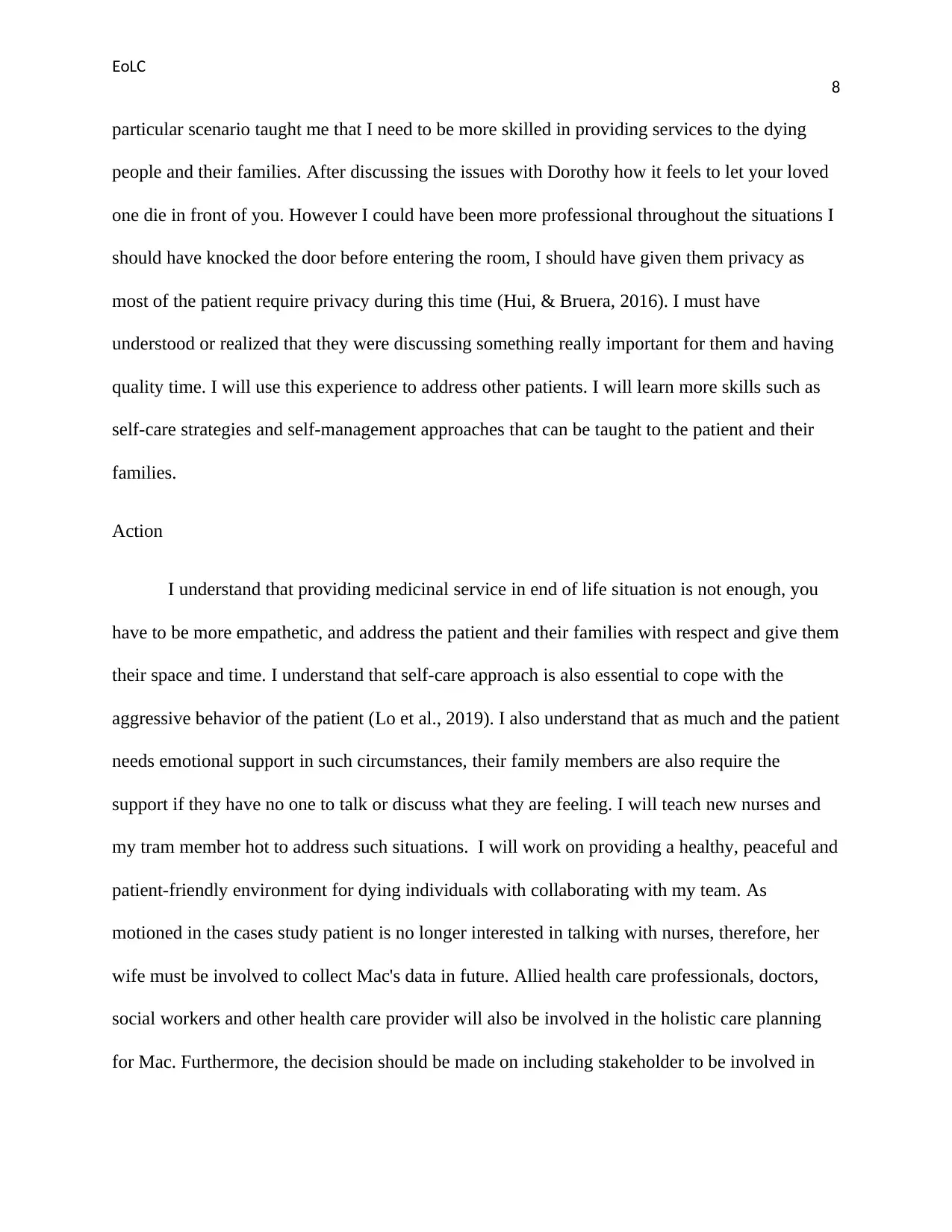
EoLC
8
particular scenario taught me that I need to be more skilled in providing services to the dying
people and their families. After discussing the issues with Dorothy how it feels to let your loved
one die in front of you. However I could have been more professional throughout the situations I
should have knocked the door before entering the room, I should have given them privacy as
most of the patient require privacy during this time (Hui, & Bruera, 2016). I must have
understood or realized that they were discussing something really important for them and having
quality time. I will use this experience to address other patients. I will learn more skills such as
self-care strategies and self-management approaches that can be taught to the patient and their
families.
Action
I understand that providing medicinal service in end of life situation is not enough, you
have to be more empathetic, and address the patient and their families with respect and give them
their space and time. I understand that self-care approach is also essential to cope with the
aggressive behavior of the patient (Lo et al., 2019). I also understand that as much and the patient
needs emotional support in such circumstances, their family members are also require the
support if they have no one to talk or discuss what they are feeling. I will teach new nurses and
my tram member hot to address such situations. I will work on providing a healthy, peaceful and
patient-friendly environment for dying individuals with collaborating with my team. As
motioned in the cases study patient is no longer interested in talking with nurses, therefore, her
wife must be involved to collect Mac's data in future. Allied health care professionals, doctors,
social workers and other health care provider will also be involved in the holistic care planning
for Mac. Furthermore, the decision should be made on including stakeholder to be involved in
8
particular scenario taught me that I need to be more skilled in providing services to the dying
people and their families. After discussing the issues with Dorothy how it feels to let your loved
one die in front of you. However I could have been more professional throughout the situations I
should have knocked the door before entering the room, I should have given them privacy as
most of the patient require privacy during this time (Hui, & Bruera, 2016). I must have
understood or realized that they were discussing something really important for them and having
quality time. I will use this experience to address other patients. I will learn more skills such as
self-care strategies and self-management approaches that can be taught to the patient and their
families.
Action
I understand that providing medicinal service in end of life situation is not enough, you
have to be more empathetic, and address the patient and their families with respect and give them
their space and time. I understand that self-care approach is also essential to cope with the
aggressive behavior of the patient (Lo et al., 2019). I also understand that as much and the patient
needs emotional support in such circumstances, their family members are also require the
support if they have no one to talk or discuss what they are feeling. I will teach new nurses and
my tram member hot to address such situations. I will work on providing a healthy, peaceful and
patient-friendly environment for dying individuals with collaborating with my team. As
motioned in the cases study patient is no longer interested in talking with nurses, therefore, her
wife must be involved to collect Mac's data in future. Allied health care professionals, doctors,
social workers and other health care provider will also be involved in the holistic care planning
for Mac. Furthermore, the decision should be made on including stakeholder to be involved in
⊘ This is a preview!⊘
Do you want full access?
Subscribe today to unlock all pages.

Trusted by 1+ million students worldwide
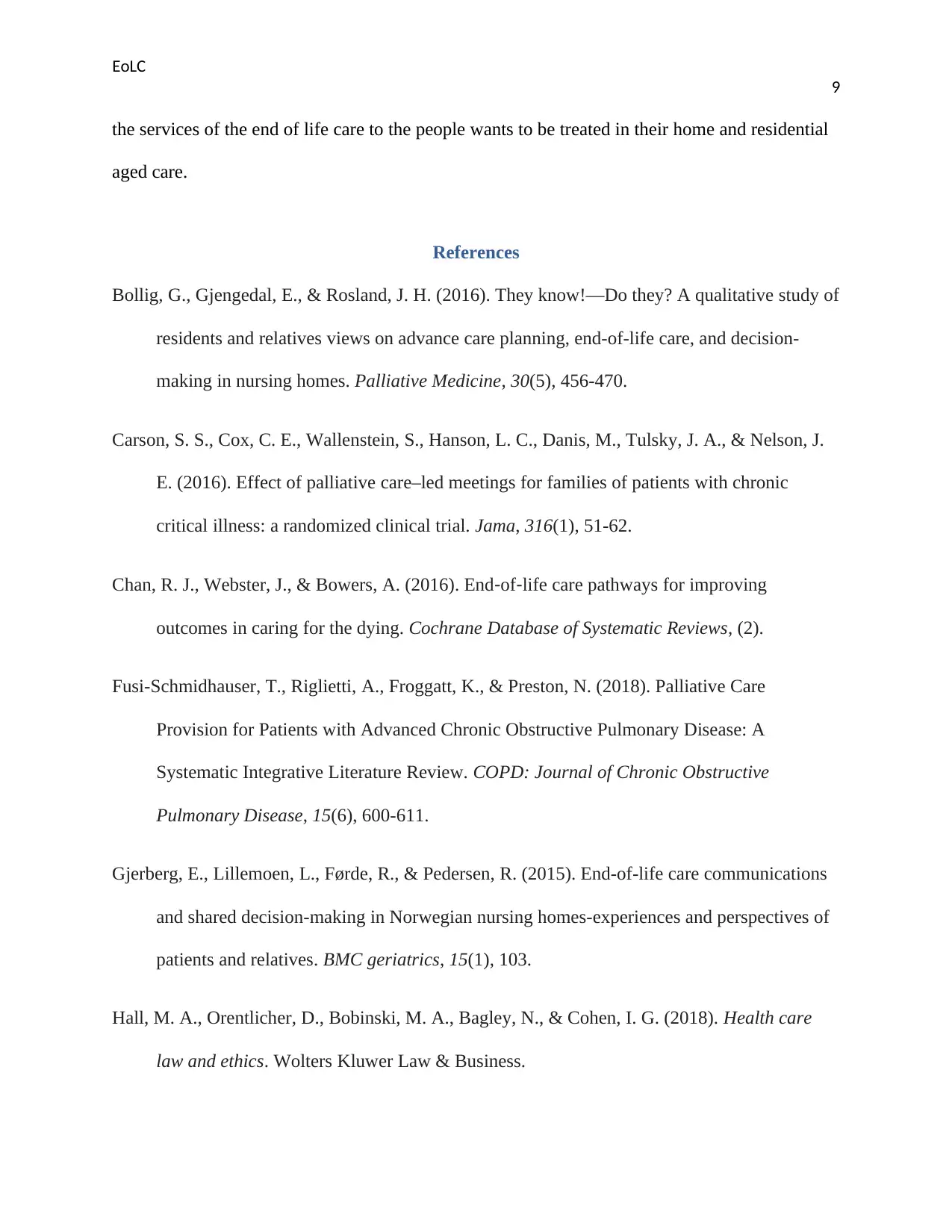
EoLC
9
the services of the end of life care to the people wants to be treated in their home and residential
aged care.
References
Bollig, G., Gjengedal, E., & Rosland, J. H. (2016). They know!—Do they? A qualitative study of
residents and relatives views on advance care planning, end-of-life care, and decision-
making in nursing homes. Palliative Medicine, 30(5), 456-470.
Carson, S. S., Cox, C. E., Wallenstein, S., Hanson, L. C., Danis, M., Tulsky, J. A., & Nelson, J.
E. (2016). Effect of palliative care–led meetings for families of patients with chronic
critical illness: a randomized clinical trial. Jama, 316(1), 51-62.
Chan, R. J., Webster, J., & Bowers, A. (2016). End‐of‐life care pathways for improving
outcomes in caring for the dying. Cochrane Database of Systematic Reviews, (2).
Fusi-Schmidhauser, T., Riglietti, A., Froggatt, K., & Preston, N. (2018). Palliative Care
Provision for Patients with Advanced Chronic Obstructive Pulmonary Disease: A
Systematic Integrative Literature Review. COPD: Journal of Chronic Obstructive
Pulmonary Disease, 15(6), 600-611.
Gjerberg, E., Lillemoen, L., Førde, R., & Pedersen, R. (2015). End-of-life care communications
and shared decision-making in Norwegian nursing homes-experiences and perspectives of
patients and relatives. BMC geriatrics, 15(1), 103.
Hall, M. A., Orentlicher, D., Bobinski, M. A., Bagley, N., & Cohen, I. G. (2018). Health care
law and ethics. Wolters Kluwer Law & Business.
9
the services of the end of life care to the people wants to be treated in their home and residential
aged care.
References
Bollig, G., Gjengedal, E., & Rosland, J. H. (2016). They know!—Do they? A qualitative study of
residents and relatives views on advance care planning, end-of-life care, and decision-
making in nursing homes. Palliative Medicine, 30(5), 456-470.
Carson, S. S., Cox, C. E., Wallenstein, S., Hanson, L. C., Danis, M., Tulsky, J. A., & Nelson, J.
E. (2016). Effect of palliative care–led meetings for families of patients with chronic
critical illness: a randomized clinical trial. Jama, 316(1), 51-62.
Chan, R. J., Webster, J., & Bowers, A. (2016). End‐of‐life care pathways for improving
outcomes in caring for the dying. Cochrane Database of Systematic Reviews, (2).
Fusi-Schmidhauser, T., Riglietti, A., Froggatt, K., & Preston, N. (2018). Palliative Care
Provision for Patients with Advanced Chronic Obstructive Pulmonary Disease: A
Systematic Integrative Literature Review. COPD: Journal of Chronic Obstructive
Pulmonary Disease, 15(6), 600-611.
Gjerberg, E., Lillemoen, L., Førde, R., & Pedersen, R. (2015). End-of-life care communications
and shared decision-making in Norwegian nursing homes-experiences and perspectives of
patients and relatives. BMC geriatrics, 15(1), 103.
Hall, M. A., Orentlicher, D., Bobinski, M. A., Bagley, N., & Cohen, I. G. (2018). Health care
law and ethics. Wolters Kluwer Law & Business.
Paraphrase This Document
Need a fresh take? Get an instant paraphrase of this document with our AI Paraphraser
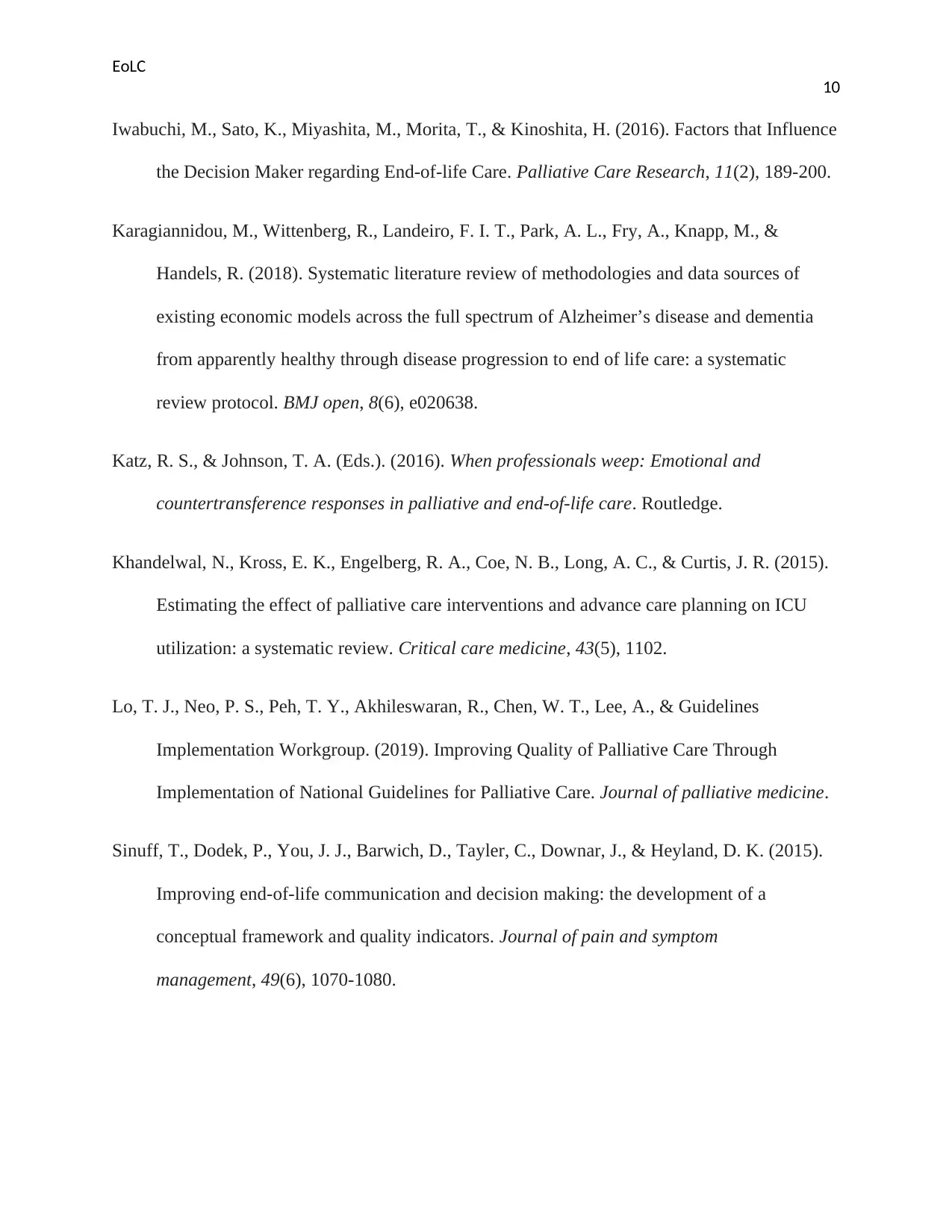
EoLC
10
Iwabuchi, M., Sato, K., Miyashita, M., Morita, T., & Kinoshita, H. (2016). Factors that Influence
the Decision Maker regarding End-of-life Care. Palliative Care Research, 11(2), 189-200.
Karagiannidou, M., Wittenberg, R., Landeiro, F. I. T., Park, A. L., Fry, A., Knapp, M., &
Handels, R. (2018). Systematic literature review of methodologies and data sources of
existing economic models across the full spectrum of Alzheimer’s disease and dementia
from apparently healthy through disease progression to end of life care: a systematic
review protocol. BMJ open, 8(6), e020638.
Katz, R. S., & Johnson, T. A. (Eds.). (2016). When professionals weep: Emotional and
countertransference responses in palliative and end-of-life care. Routledge.
Khandelwal, N., Kross, E. K., Engelberg, R. A., Coe, N. B., Long, A. C., & Curtis, J. R. (2015).
Estimating the effect of palliative care interventions and advance care planning on ICU
utilization: a systematic review. Critical care medicine, 43(5), 1102.
Lo, T. J., Neo, P. S., Peh, T. Y., Akhileswaran, R., Chen, W. T., Lee, A., & Guidelines
Implementation Workgroup. (2019). Improving Quality of Palliative Care Through
Implementation of National Guidelines for Palliative Care. Journal of palliative medicine.
Sinuff, T., Dodek, P., You, J. J., Barwich, D., Tayler, C., Downar, J., & Heyland, D. K. (2015).
Improving end-of-life communication and decision making: the development of a
conceptual framework and quality indicators. Journal of pain and symptom
management, 49(6), 1070-1080.
10
Iwabuchi, M., Sato, K., Miyashita, M., Morita, T., & Kinoshita, H. (2016). Factors that Influence
the Decision Maker regarding End-of-life Care. Palliative Care Research, 11(2), 189-200.
Karagiannidou, M., Wittenberg, R., Landeiro, F. I. T., Park, A. L., Fry, A., Knapp, M., &
Handels, R. (2018). Systematic literature review of methodologies and data sources of
existing economic models across the full spectrum of Alzheimer’s disease and dementia
from apparently healthy through disease progression to end of life care: a systematic
review protocol. BMJ open, 8(6), e020638.
Katz, R. S., & Johnson, T. A. (Eds.). (2016). When professionals weep: Emotional and
countertransference responses in palliative and end-of-life care. Routledge.
Khandelwal, N., Kross, E. K., Engelberg, R. A., Coe, N. B., Long, A. C., & Curtis, J. R. (2015).
Estimating the effect of palliative care interventions and advance care planning on ICU
utilization: a systematic review. Critical care medicine, 43(5), 1102.
Lo, T. J., Neo, P. S., Peh, T. Y., Akhileswaran, R., Chen, W. T., Lee, A., & Guidelines
Implementation Workgroup. (2019). Improving Quality of Palliative Care Through
Implementation of National Guidelines for Palliative Care. Journal of palliative medicine.
Sinuff, T., Dodek, P., You, J. J., Barwich, D., Tayler, C., Downar, J., & Heyland, D. K. (2015).
Improving end-of-life communication and decision making: the development of a
conceptual framework and quality indicators. Journal of pain and symptom
management, 49(6), 1070-1080.
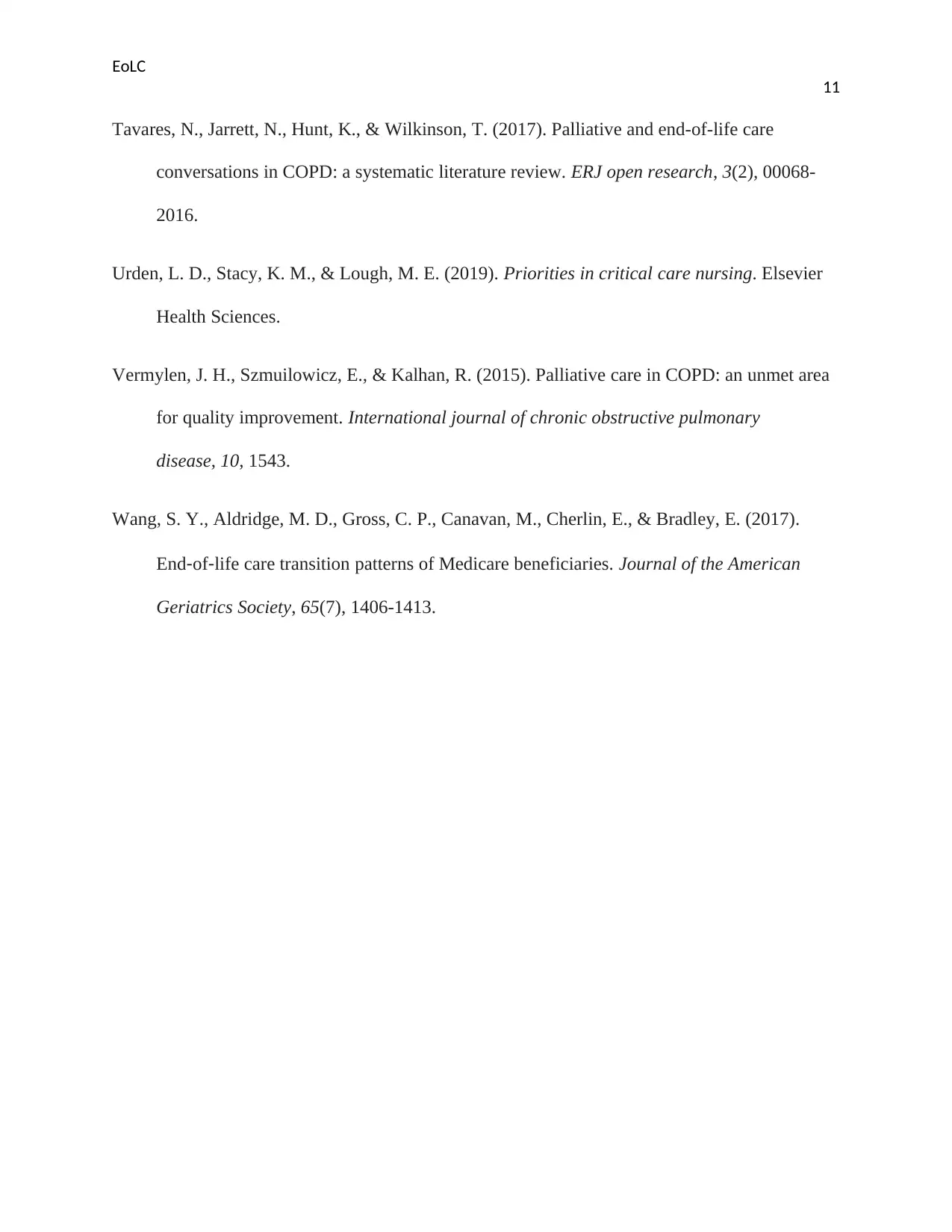
EoLC
11
Tavares, N., Jarrett, N., Hunt, K., & Wilkinson, T. (2017). Palliative and end-of-life care
conversations in COPD: a systematic literature review. ERJ open research, 3(2), 00068-
2016.
Urden, L. D., Stacy, K. M., & Lough, M. E. (2019). Priorities in critical care nursing. Elsevier
Health Sciences.
Vermylen, J. H., Szmuilowicz, E., & Kalhan, R. (2015). Palliative care in COPD: an unmet area
for quality improvement. International journal of chronic obstructive pulmonary
disease, 10, 1543.
Wang, S. Y., Aldridge, M. D., Gross, C. P., Canavan, M., Cherlin, E., & Bradley, E. (2017).
End‐of‐life care transition patterns of Medicare beneficiaries. Journal of the American
Geriatrics Society, 65(7), 1406-1413.
11
Tavares, N., Jarrett, N., Hunt, K., & Wilkinson, T. (2017). Palliative and end-of-life care
conversations in COPD: a systematic literature review. ERJ open research, 3(2), 00068-
2016.
Urden, L. D., Stacy, K. M., & Lough, M. E. (2019). Priorities in critical care nursing. Elsevier
Health Sciences.
Vermylen, J. H., Szmuilowicz, E., & Kalhan, R. (2015). Palliative care in COPD: an unmet area
for quality improvement. International journal of chronic obstructive pulmonary
disease, 10, 1543.
Wang, S. Y., Aldridge, M. D., Gross, C. P., Canavan, M., Cherlin, E., & Bradley, E. (2017).
End‐of‐life care transition patterns of Medicare beneficiaries. Journal of the American
Geriatrics Society, 65(7), 1406-1413.
⊘ This is a preview!⊘
Do you want full access?
Subscribe today to unlock all pages.

Trusted by 1+ million students worldwide
1 out of 12
Related Documents
Your All-in-One AI-Powered Toolkit for Academic Success.
+13062052269
info@desklib.com
Available 24*7 on WhatsApp / Email
![[object Object]](/_next/static/media/star-bottom.7253800d.svg)
Unlock your academic potential
Copyright © 2020–2026 A2Z Services. All Rights Reserved. Developed and managed by ZUCOL.





